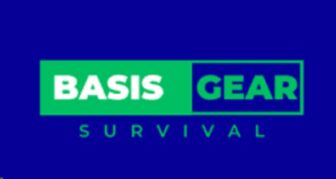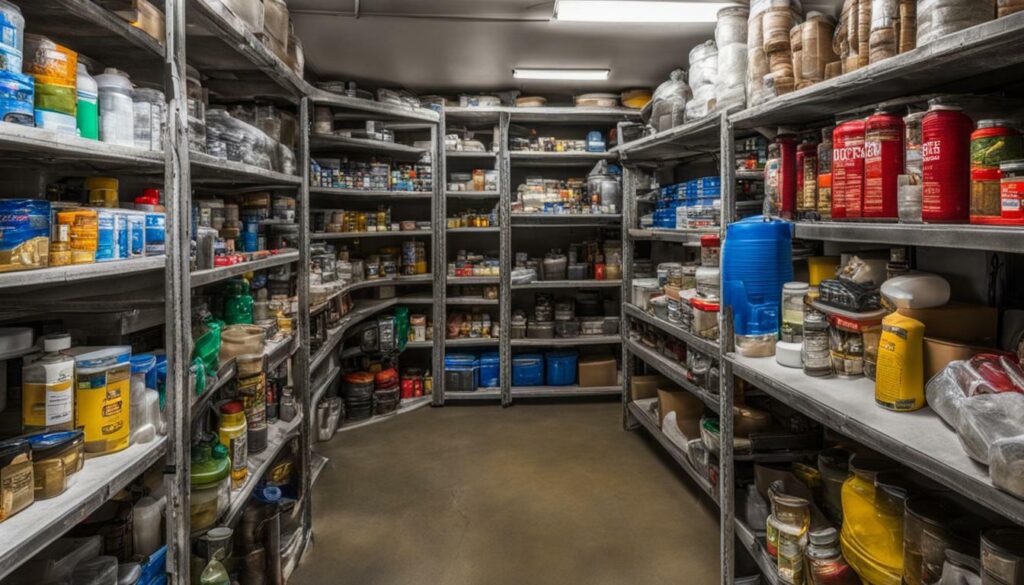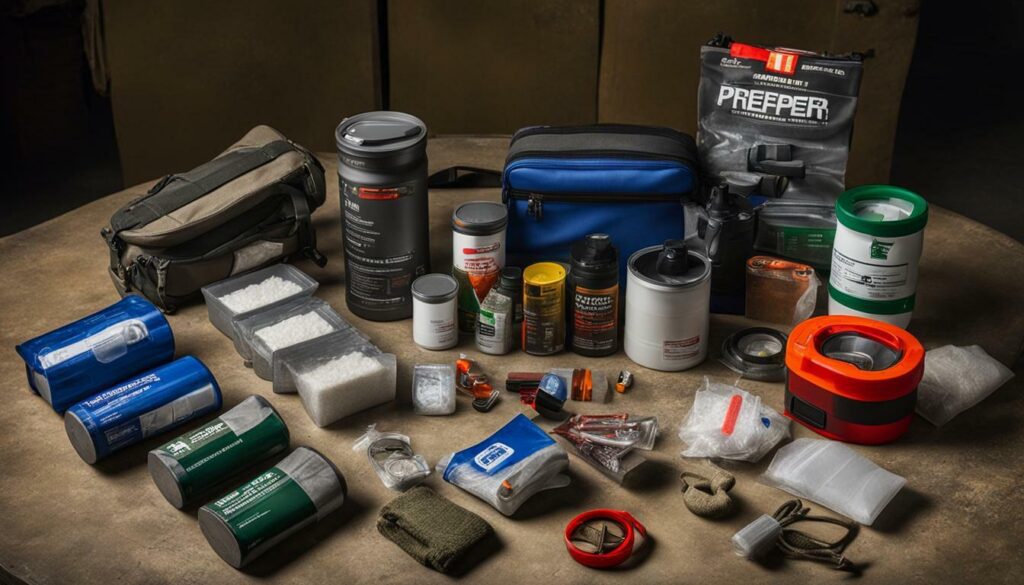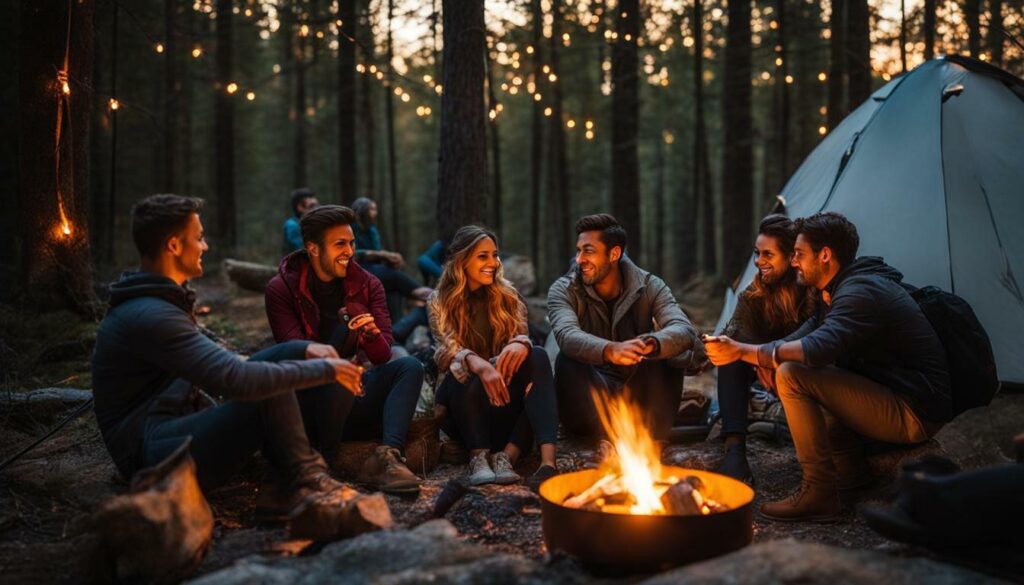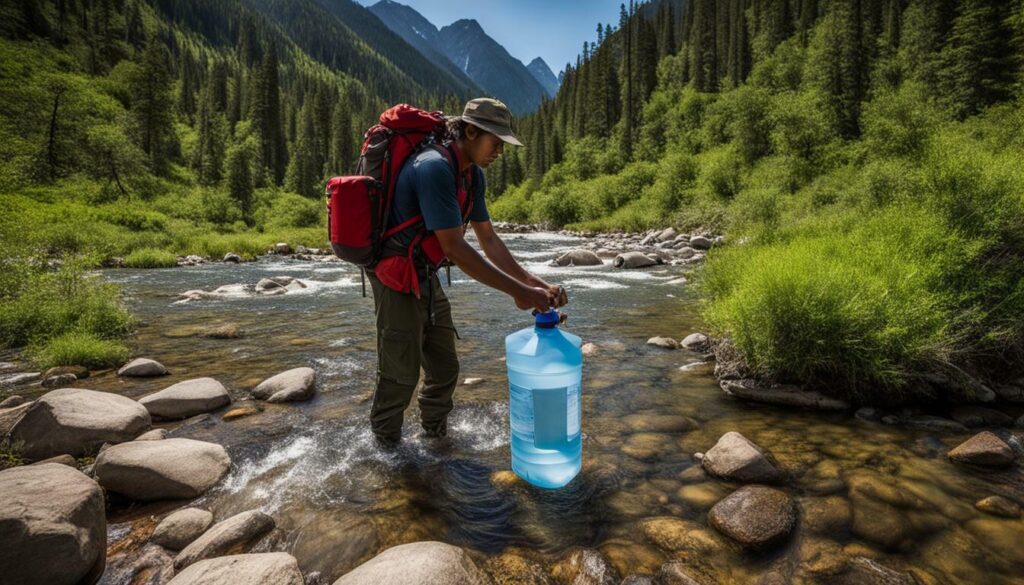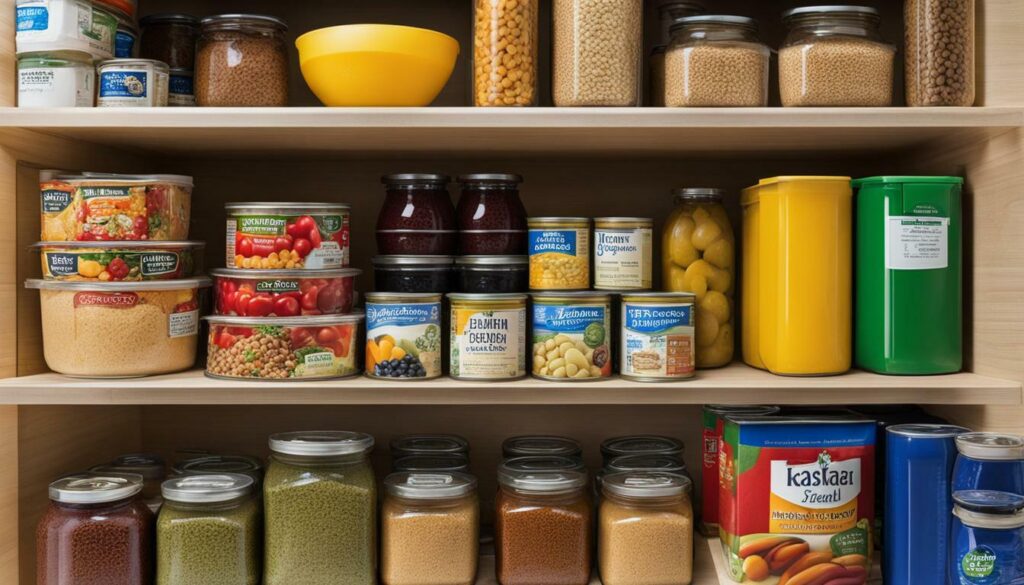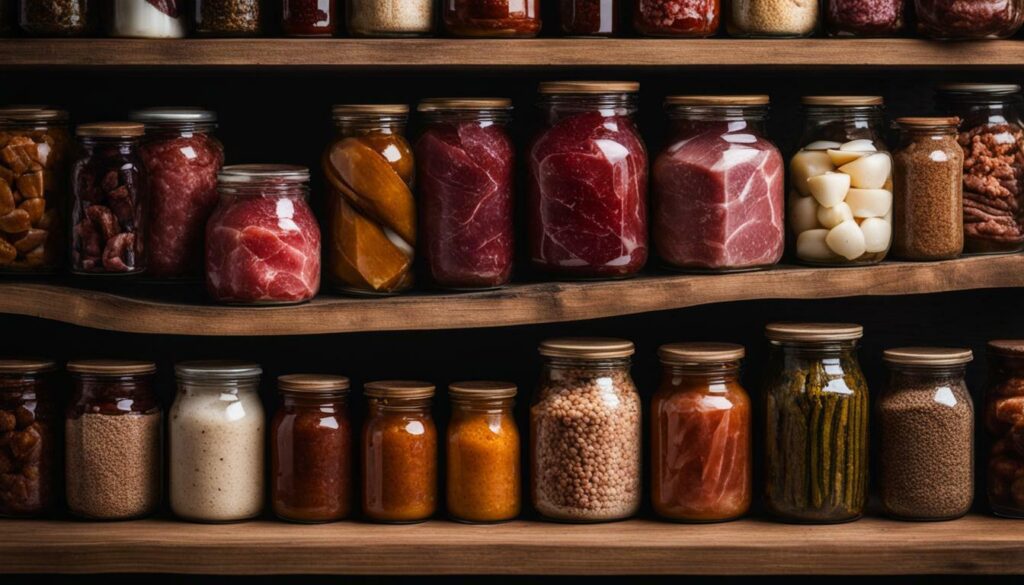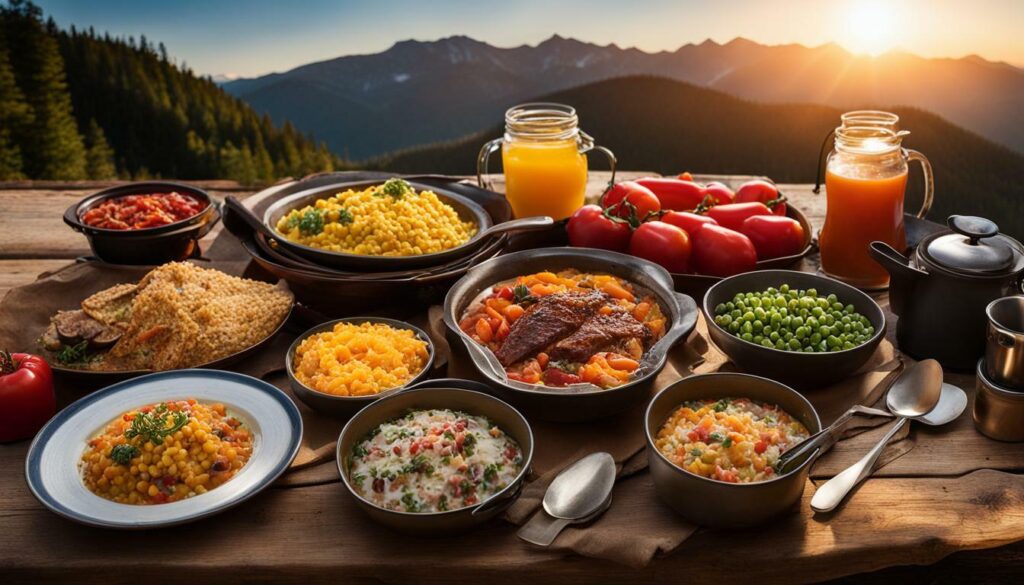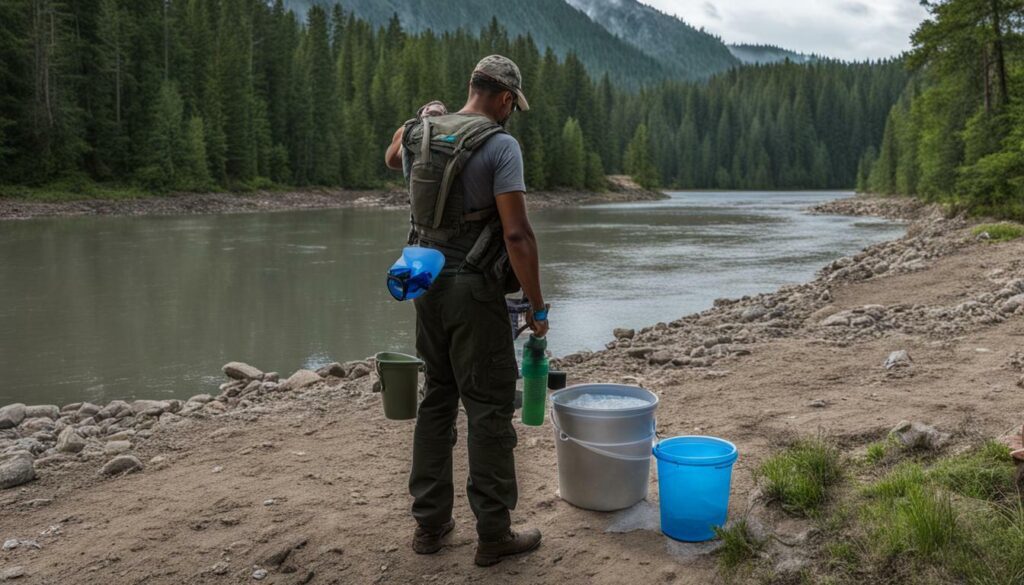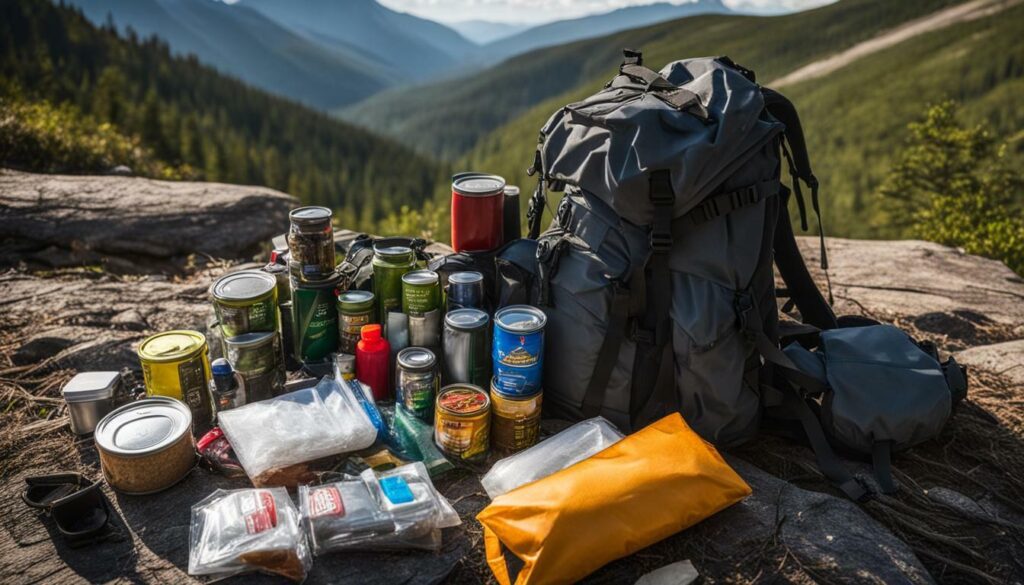

Are you ready to unlock the secrets of survival and learn how to be a prepper? In this comprehensive guide, I will provide you with expert tips, strategies, and essential skills to help you be prepared for any scenario.
Key Takeaways:
- Acquiring a wide range of skills is crucial for becoming a prepper.
- Skills such as growing food, first aid, and constructing essential items are essential in a post-collapse society.
- Hunting, trapping, and fishing skills can provide additional food sources in survival scenarios.
- Preserving and storing food is important for ensuring a long-term food supply.
- Learning communication and signaling methods can be vital during emergencies.
Understanding the Prepper Lifestyle
To truly become a prepper, it is essential to embrace a lifestyle that prioritizes self-sufficiency and readiness for any potential disaster. The prepper lifestyle goes beyond simply stockpiling supplies; it involves developing a range of skills and knowledge that can prove invaluable in a post-collapse society. From growing your own food to mastering first aid, here are some key aspects of the prepper lifestyle.
Self-Sufficiency
One of the core principles of prepping is self-sufficiency. This means reducing dependence on external sources by developing the skills and resources necessary to meet your own needs. Learning how to grow your own food through gardening and foraging for wild edibles is an essential part of this lifestyle. By cultivating a self-sufficient mindset, you’ll be better equipped to handle potential shortages or disruptions in the food supply.
Disaster Readiness
Disaster readiness is another crucial aspect of the prepper lifestyle. This entails being prepared for a wide range of possible scenarios, such as natural disasters, economic collapse, or civil unrest. Building and constructing essential items, such as shelters and tools, is vital for ensuring your safety and comfort during challenging times. Additionally, acquiring skills in hunting, trapping, and fishing can provide you with alternative food sources in case of emergencies.
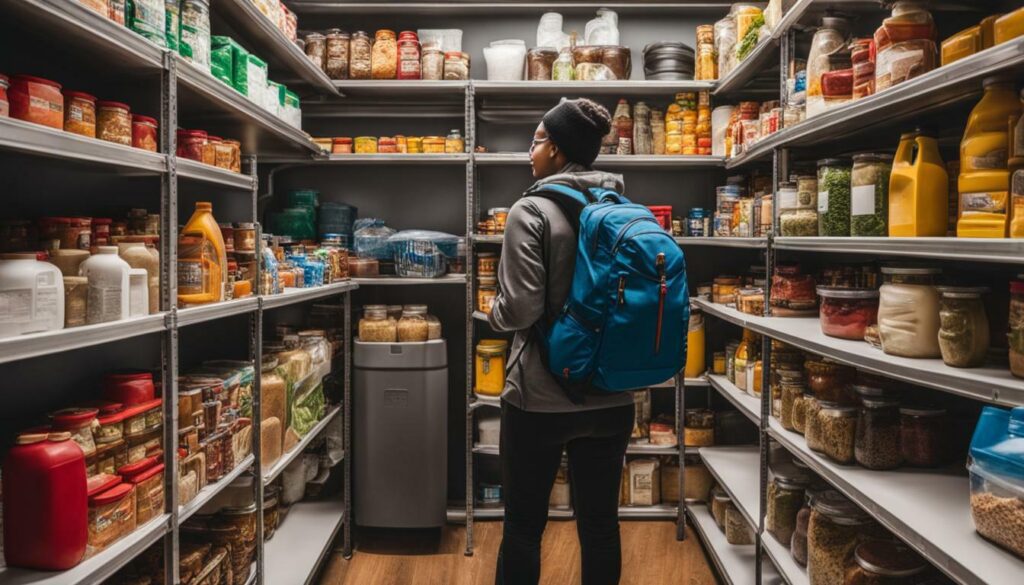

Being a prepper doesn’t mean isolating yourself from others. In fact, many preppers emphasize the importance of community and knowledge sharing. Building a network of like-minded individuals can provide a support system and a means of sharing valuable information and skills. Participating in local prepper groups, attending workshops, and sharing resources can help you expand your knowledge base and enhance your overall preparedness.
| Skills | Description |
|---|---|
| First Aid | Learning basic first aid skills can mean the difference between life and death in an emergency situation. Familiarize yourself with techniques for treating wounds, performing CPR, and providing immediate care. |
| Canning and Dehydrating | Preserving and storing food is crucial for long-term survival. Mastering the art of canning and dehydrating food can help you build a stockpile that will last through any crisis. |
| Sewing and Knitting | Developing sewing and knitting skills allows you to mend clothing, create new garments, and even make blankets or other essential items. These skills are invaluable in a post-collapse society. |
| Navigation | Being able to navigate without modern technology is a vital skill for preppers. Learn how to use a compass, read maps, and navigate using natural landmarks to ensure you can find your way in any situation. |
Embracing the prepper lifestyle means adopting a mindset of self-sufficiency, disaster readiness, and community collaboration. By developing a wide range of skills and resources, you can be better prepared for any potential disaster that may arise.
Building Your Prepper Supplies
Building a stockpile of prepper supplies is a crucial step in preparing for any emergency or disaster situation. Having a well-stocked inventory of essential items ensures that you and your loved ones can sustain yourselves during a crisis. Here are some key considerations when it comes to building your prepper supplies:
- Food: Stock up on non-perishable items like canned goods, dry goods, and long-lasting staples such as rice and pasta. Aim for a variety of nutritious options to meet your dietary needs.
- Water: Store an ample supply of clean, potable water. The general rule of thumb is to have at least one gallon of water per person per day for drinking and sanitation purposes.
- Medical supplies: Have a well-stocked first aid kit that includes essential items like bandages, antiseptics, pain relievers, and prescription medications. Consider any specific medical needs of your family members when preparing your supplies.
- Essential tools: Include items such as a multi-tool, flashlight, batteries, rope, duct tape, and a fire starter in your supplies. These tools can prove invaluable in various situations and aid in survival.
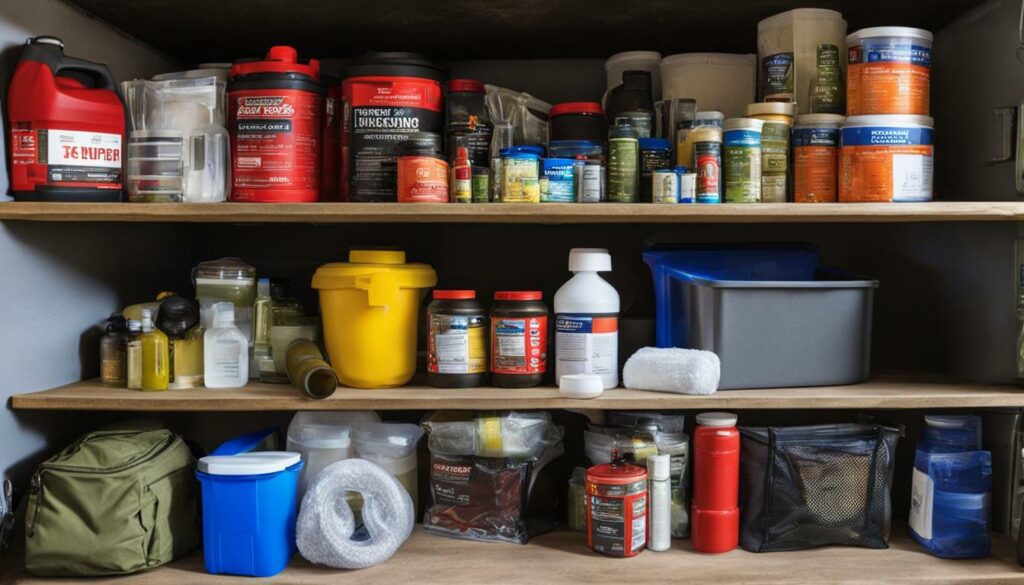

It is also important to regularly rotate and replace items in your prepper supplies to ensure freshness and functionality. Pay attention to expiration dates and use items from your stockpile as part of your regular household rotation to avoid waste.
Lastly, organize your supplies in a systematic and easily accessible manner. Consider using storage bins, shelves, or a dedicated area in your home to keep your prepper supplies well-organized and easily retrievable when needed.
By focusing on these key areas and continuously assessing and updating your supplies, you can be better prepared to face any emergency or disaster situation that may arise.
Mastering Emergency Preparedness
Being prepared for emergencies means mastering a range of essential survival skills that can be vital in preserving life and ensuring safety. In a disaster scenario, having the knowledge and ability to handle various challenges can make a significant difference in your ability to navigate through and overcome obstacles. Here are some key survival skills to focus on:
First Aid and Medical Skills
When emergencies occur, being able to provide immediate medical assistance can be crucial. Learning first aid techniques, such as CPR, wound care, and basic life support, can enable you to stabilize injured individuals until professional medical help arrives. Additionally, gaining knowledge about herbal medicine and natural remedies can provide alternative options for treating minor ailments and injuries when traditional medical resources may be limited.
Communication and Signaling
In times of crisis, effective communication is essential. Knowing how to use various communication methods, such as Morse code and ham radio operation, can help you stay connected with others and relay important information. Having the ability to send and receive signals can be critical when traditional communication channels are disrupted or unavailable.
Navigation and Orientation
Having the skills to navigate and orient yourself in unfamiliar terrain can be critical for survival. Understanding how to use a compass, read topographic maps, and determine cardinal directions using celestial cues can enable you to find your way to safety, locate resources, and avoid potentially dangerous areas.
| Skill | Description |
|---|---|
| First Aid | Learn basic first aid techniques such as CPR, wound care, and basic life support. |
| Communication | Master different communication methods, including Morse code and ham radio operation. |
| Navigation | Develop skills in using a compass, reading topographic maps, and determining cardinal directions. |
Mastering emergency preparedness is an ongoing process that requires regular practice and continuous learning. Acquiring and refining these essential survival skills will not only increase your chances of surviving and thriving in difficult circumstances but also provide you with a sense of self-reliance and confidence. Remember, being prepared is the key to effectively handle any emergency situation that may arise.
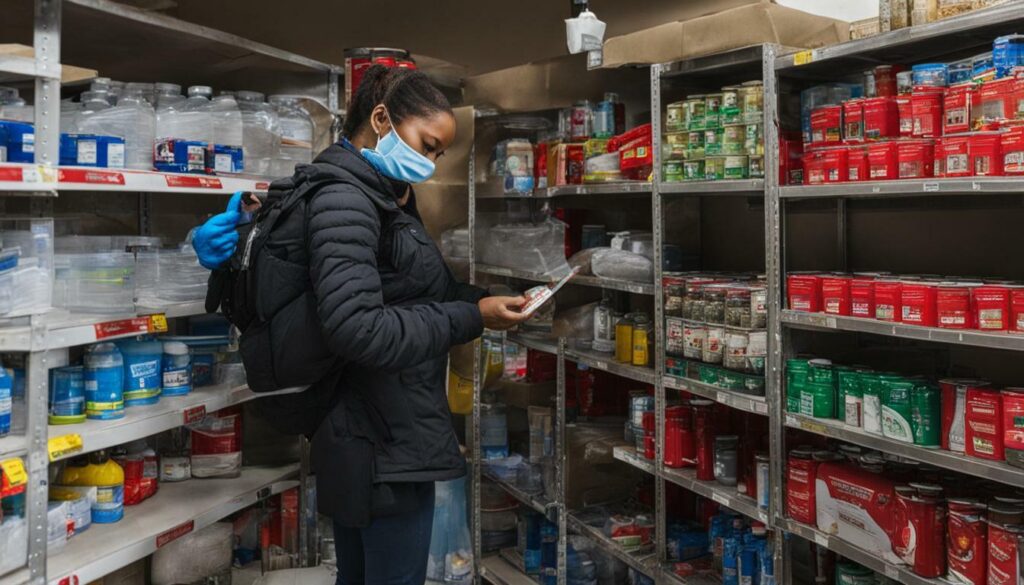

Homesteading and gardening are fundamental skills for preppers, providing a sustainable source of food and enhancing self-sufficiency. By cultivating your own fruits, vegetables, and herbs, you can reduce reliance on grocery stores and ensure access to fresh, nutritious produce in any situation. Additionally, homesteading allows you to develop a deeper connection with the land and embrace a more sustainable lifestyle.
Gardening is an essential aspect of homesteading, and it involves cultivating plants in a controlled environment. From small containers on a balcony to expansive plots of land, gardening can be adapted to fit your available space and resources. By learning about soil composition, planting seasons, and pest control, you can maximize your yields and enjoy the fruits of your labor.
When planning your garden, consider the specific needs of the plants you wish to grow. Some vegetables are easy to care for and ideal for beginners, such as tomatoes, lettuce, and beans. Herbs like basil, rosemary, and mint are also excellent choices, as they can be used in cooking or for medicinal purposes.
To further enhance your self-sufficiency, consider incorporating permaculture principles into your gardening practices. Permaculture emphasizes the creation of self-sustaining ecosystems that require minimal intervention. By designing your garden to mimic natural patterns and utilize companion planting techniques, you can achieve a more resilient and productive system.
The Benefits of Homesteading and Gardening
“Homesteading and gardening provide a sense of empowerment and self-reliance. By growing your own food, you have control over the quality and safety of what you consume. It also reduces reliance on industrial agriculture, which is often associated with environmental degradation and the use of harmful chemicals. Homesteading and gardening allow individuals to reconnect with nature and foster a greater appreciation for the Earth’s resources.”
In addition to the food security benefits, homesteading and gardening offer numerous other advantages. They provide an opportunity to engage in physical activity, promote mental well-being, and serve as a form of therapy. Spending time in nature, tending to plants, and witnessing their growth can be incredibly rewarding and calming.
Furthermore, homesteading and gardening can be a great way to share resources and build a sense of community. You can exchange surplus produce with neighbors, participate in local farmers’ markets, or join community gardens. These interactions foster social connections and create a network of support, which can be invaluable during challenging times.
By incorporating homesteading and gardening into your prepping journey, you can cultivate self-sufficiency, enhance your connection with nature, and ensure a sustainable source of food for yourself and your loved ones. Start small, learn from experienced gardeners, and embrace the rewarding journey of growing your own food. The possibilities are endless, and the benefits far outweigh the initial effort.
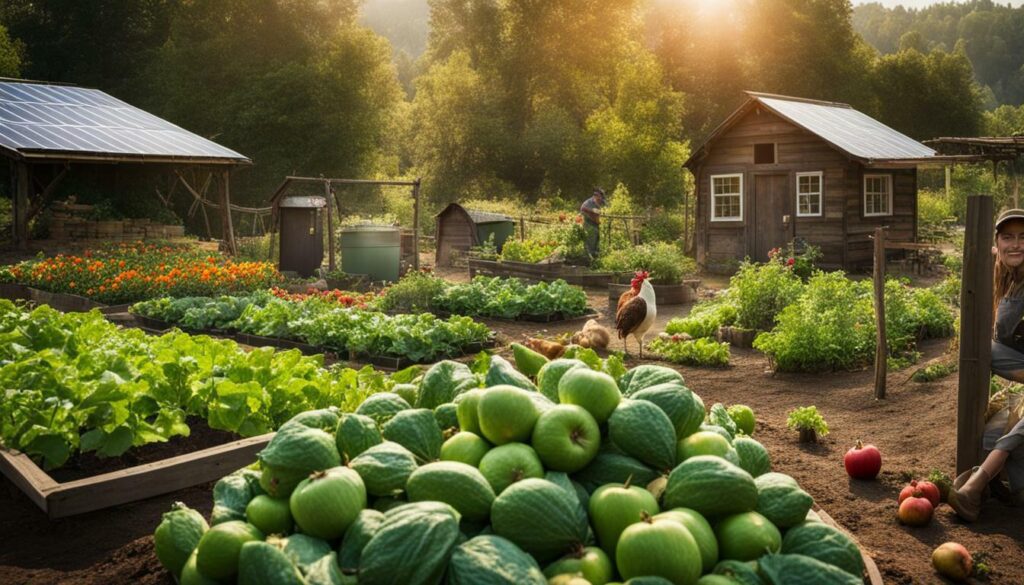

| Items | Considerations |
|---|---|
| Seeds and Plants | Choose varieties suited to your local climate and growing conditions. |
| Garden Tools | Invest in essential tools such as a shovel, rake, hoe, and watering can. |
| Compost Bin | Create nutrient-rich compost to improve soil fertility. |
| Irrigation System | Consider installing a drip irrigation system to conserve water and provide consistent moisture to plants. |
| Pest Control Methods | Research organic pest control strategies to protect your crops without harmful chemicals. |
| Plant Supports | Depending on the plants you grow, you may need stakes, trellises, or cages to support their growth. |
| Harvesting and Preservation Supplies | Ensure you have the necessary tools for harvesting, such as scissors or shears, as well as equipment for preserving your harvest, such as canning jars and dehydrators. |
Remember, homesteading and gardening are lifelong learning processes. Embrace the journey, learn from your successes and failures, and enjoy the bounty that the Earth provides.
Hunting, Trapping, and Fishing Skills
To truly be self-reliant, preppers should acquire the skills necessary to hunt, trap, and fish for food in the wild. These skills not only provide a sustainable source of nutrition, but also enable preppers to adapt and survive in various environments. Let’s explore some essential hunting, trapping, and fishing skills every prepper should consider mastering.
Hunting
Hunting involves tracking and harvesting wild game for food. Preppers can learn to hunt with firearms, bows and arrows, or even primitive weapons. Understanding animal behavior, learning to read tracks and signs, and honing marksmanship skills are crucial for successful hunting. Additionally, acquiring knowledge of local wildlife, hunting regulations, and ethical hunting practices is essential.
Trapping
Trapping is an effective way to catch animals without actively pursuing them. Preppers can set traps to capture small game such as rabbits, squirrels, or beavers. Learning different trap types, such as snares, deadfalls, and conibears, is essential for successful trapping. It’s important to know the habits and habitats of target animals, as well as how to properly set and conceal traps.
Fishing
Fishing provides a consistent and reliable source of protein in survival situations. Preppers can learn various fishing techniques such as angling, netting, and spearfishing. Understanding fish behavior, identifying suitable fishing spots, and knowing how to properly handle and clean fish are vital skills. Familiarizing oneself with different fishing knots and rig setups will also improve success rates.
By acquiring hunting, trapping, and fishing skills, preppers can increase their self-sufficiency and adaptability in the wild. Remember, practice makes perfect, so make sure to regularly hone these skills and stay prepared for any survival scenario.


Properly preserving and storing food is crucial for preppers, allowing for an extended shelf life and ensuring an adequate food supply in times of scarcity. As a prepper, it is essential to be well-equipped with the knowledge and techniques needed to store food for long periods. Here are some key methods of food preservation and storage that every prepper should consider:
Canning
Canning is a popular method of preserving food that involves sealing it in airtight containers, such as glass jars, to prevent the growth of bacteria and other microorganisms. This method is particularly effective for preserving fruits, vegetables, and sauces. By using a pressure canner or a water bath canner, you can safely store your canned goods for several years, providing you with a reliable source of food during emergencies.
Dehydrating
Dehydrating is another effective way to preserve food, particularly fruits, vegetables, and meats. By removing the moisture from food, you inhibit the growth of bacteria and mold while retaining most of the nutritional value. Dehydrated foods can be stored in airtight containers or vacuum-sealed bags, keeping them edible for months or even years. Additionally, dehydrated foods are lightweight and take up less space, making them ideal for bug-out bags or emergency kits.
Pickling
Pickling is a traditional method of preserving food by immersing it in a mixture of vinegar, salt, and spices. This process not only extends the shelf life of foods like cucumbers, beets, and onions but also enhances their flavor. Pickled vegetables can be stored in sterilized jars in a cool, dark place, making them a great addition to your prepper supplies. They can be enjoyed as a standalone snack or used to add a tangy kick to your meals.
| Preservation Method | Pros | Cons |
|---|---|---|
| Canning | – Long shelf life – Retains flavor and nutrients – Versatile for various food types |
– Requires specific equipment – Can be time-consuming |
| Dehydrating | – Lightweight and space-saving – Retains nutritional value – Suitable for on-the-go |
– Can alter the texture of certain foods – Requires a dehydrator or oven |
| Pickling | – Enhances flavor – Preserves vegetables for extended periods – Provides various taste options |
– May alter the texture of vegetables – Requires vinegar or other pickling agents |
Remember to label and date your preserved foods to ensure you use the oldest ones first. Regularly check the condition of your stored food to prevent spoilage and rotate your supplies to maintain freshness. By mastering the art of food preservation and storage, you will be well-prepared to weather any storm.
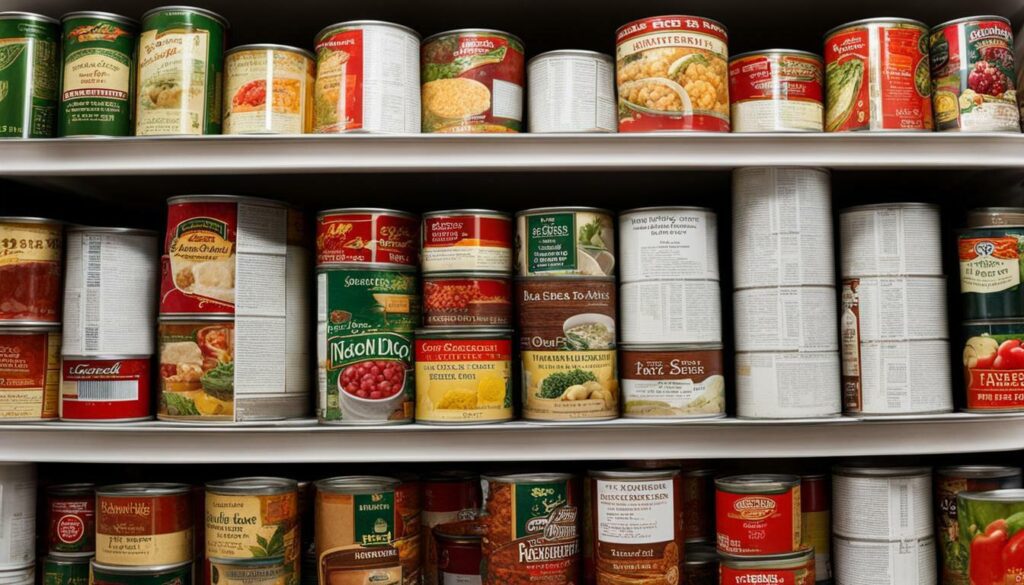

The ability to craft and construct essential items is invaluable for preppers, as it allows for self-reliance and the ability to adapt to different situations. By learning practical skills like sewing, knitting, crochet, blacksmithing, welding, and carpentry, preppers can create items that are essential for survival.
One of the key skills to develop is sewing, which enables preppers to repair and create clothing and other fabric-based items. Sewing not only extends the life of existing garments but also allows for customization and adaptation to changing weather conditions. Knitting and crochet skills are also beneficial, as they provide warmth and comfort through handmade hats, scarves, and blankets.
Blacksmithing, welding, and carpentry are important skills for constructing and repairing tools and equipment. Blacksmithing allows preppers to forge their own knives, axes, and other metal tools, ensuring their quality and reliability. Welding skills are useful for joining metal components and creating sturdy structures. Carpentry, on the other hand, allows for the construction of shelters, furniture, and storage containers.
| Practical Skills | Benefits |
|---|---|
| Sewing | Repair and customize clothing for different weather conditions. |
| Knitting and Crochet | Create handmade hats, scarves, and blankets for warmth. |
| Blacksmithing | Forge high-quality knives, axes, and other metal tools. |
| Welding | Join metal components and create sturdy structures. |
| Carpentry | Construct shelters, furniture, and storage containers. |
Quote:
“Crafting and constructing essential items not only provides practical solutions in survival situations but also imparts a sense of self-reliance and empowerment. By mastering these skills, preppers can ensure their ability to adapt and thrive in any scenario.”
It is important for preppers to regularly practice and expand their crafting and constructing skills. This can be done through workshops, online tutorials, and hands-on experience. By acquiring these essential skills, preppers can be better prepared to face the challenges of a post-collapse society.
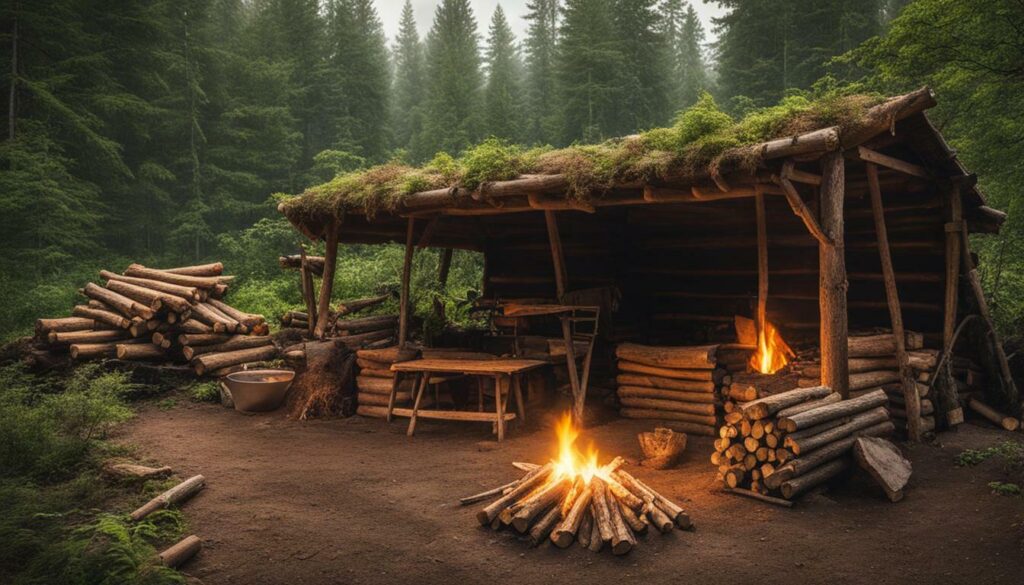

In a post-collapse society, having knowledge of herbal medicine and natural remedies can be essential for maintaining health and treating common ailments. By harnessing the power of plants and natural ingredients, one can create effective remedies that are readily available even in a survival scenario.
Herbal medicine has been practiced for centuries, and it involves using plants and their extracts to promote healing and well-being. Some common herbs with medicinal properties include chamomile, lavender, peppermint, and ginger. These herbs can be used to make teas, tinctures, salves, and more.
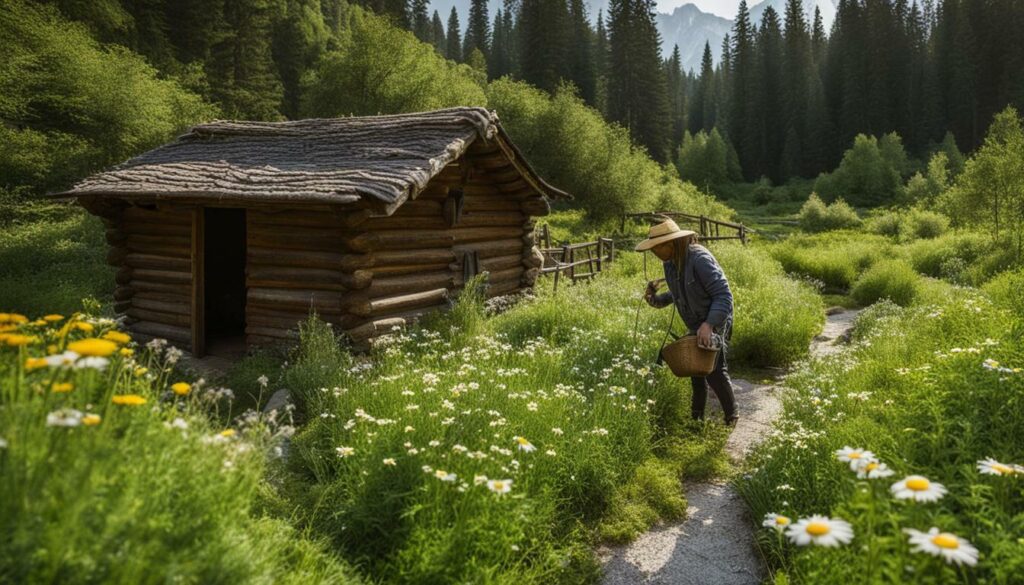

For example, chamomile tea is known for its calming properties and can help relieve stress and promote better sleep. Lavender oil can be applied topically to soothe skin irritations and reduce inflammation. Peppermint leaves can be brewed into a tea to aid digestion and alleviate headaches. Ginger can be used to make a warming tea that helps with nausea and boosts the immune system.
It is important to note that while herbal medicine can be highly effective, it is not a substitute for professional medical advice. In a post-collapse society where access to traditional medical care may be limited, herbal medicine can provide a valuable alternative for maintaining health and treating common ailments.
| Herb | Common Uses |
|---|---|
| Chamomile | Calming, sleep aid |
| Lavender | Skin irritations, inflammation |
| Peppermint | Indigestion, headaches |
| Ginger | Nausea, immune boosting |
By learning about herbal medicine and natural remedies, individuals can enhance their prepper lifestyle and ensure their well-being in a post-collapse society. Whether it’s growing medicinal herbs, foraging for wild plants, or creating homemade remedies, the knowledge and skills gained in this area can be invaluable for maintaining health and promoting healing when traditional medical resources are scarce.
Communication and Signaling in Survival Situations
Effective communication and signaling can be the key to survival in emergency situations where traditional methods may be compromised. When faced with a disaster or crisis, being able to effectively convey your location, needs, and intentions can make all the difference. In this section, I will explore various communication and signaling techniques that can be essential in survival scenarios.
One of the most reliable and long-range communication methods is the use of ham radios. These devices allow you to transmit and receive messages over long distances, even when other forms of communication are unavailable. Learning the basics of ham radio operation can provide you with a vital lifeline to the outside world, allowing you to gather information, request assistance, or coordinate with other survivors.
Additionally, Morse code is a time-tested form of communication that can be easily learned and used in emergency situations. By knowing how to transmit and receive messages using Morse code, you can communicate silently over short distances, alerting others to your presence or conveying important information. Morse code can be transmitted using various signaling methods, such as flashlight signals, whistle blasts, or tapping on surfaces to create audible sounds.
In summary, mastering communication and signaling skills is crucial for anyone seeking to be prepared for survival situations. By learning the art of ham radio operation and Morse code, you can significantly enhance your ability to communicate and coordinate with others in times of crisis. Remember, effective communication can be a lifeline during emergencies, providing you with the necessary support and resources needed to overcome challenging circumstances.


| Communication and Signaling Techniques | Advantages |
|---|---|
| Ham radios | – Long-range communication – Reliable even in remote areas – Can transmit voice and data |
| Morse code | – Silent communication – Easily learnable – Can be transmitted using various signaling methods |
Primitive Skills: Fire-making, Shelter-building, and Foraging
Mastering primitive skills is fundamental for preppers, allowing for self-sufficiency and survival in the most challenging environments. In a post-collapse society, the ability to start a fire, build a shelter, and forage for food becomes invaluable. These skills have been passed down for generations, ensuring the survival of our ancestors in harsh conditions.
Fire-making, the first skill to conquer, provides warmth, a means of cooking, and a deterrent for predators. There are various methods to start a fire, including using friction with a bow drill or hand drill, striking sparks with a flint and steel, or using a magnifying glass to focus sunlight. Each method requires practice and patience, but once mastered, fire can be created even with limited resources.
Shelter-building is another essential skill for preppers. A well-constructed shelter provides protection from the elements and offers a sense of security. Natural materials such as branches, leaves, and rocks can be used to create sturdy structures like lean-tos, debris huts, or A-frames. Knowing how to select a suitable site, build a strong framework, and properly insulate the shelter is crucial for survivability.
Foraging for wild edibles is a skill that allows preppers to supplement their food supplies and maintain a varied diet. Identifying edible plants, berries, nuts, and mushrooms is essential to avoid poisonous species. Learning to recognize and harvest these natural resources can provide sustenance when food stores are depleted or inaccessible. However, it is crucial to research and practice foraging techniques to ensure safety and avoid potentially harmful plants.
| Primitive Skills | Survival Skills | Prepper Lifestyle |
|---|---|---|
| Fire-making | First Aid | Self-Sufficiency |
| Shelter-building | Navigation | Disaster Readiness |
| Foraging | Hunting | Emergency Preparedness |
Remember, in a survival situation, knowledge and skills are more valuable than any material possession. Invest time and effort into mastering these primitive skills, and you will be better prepared for any challenges that come your way.
By mastering primitive skills like fire-making, shelter-building, and foraging, preppers can increase their self-sufficiency and resilience in the face of adversity. These skills not only provide practical solutions for survival but also connect us with our ancestral heritage and foster a deeper appreciation for the natural world.
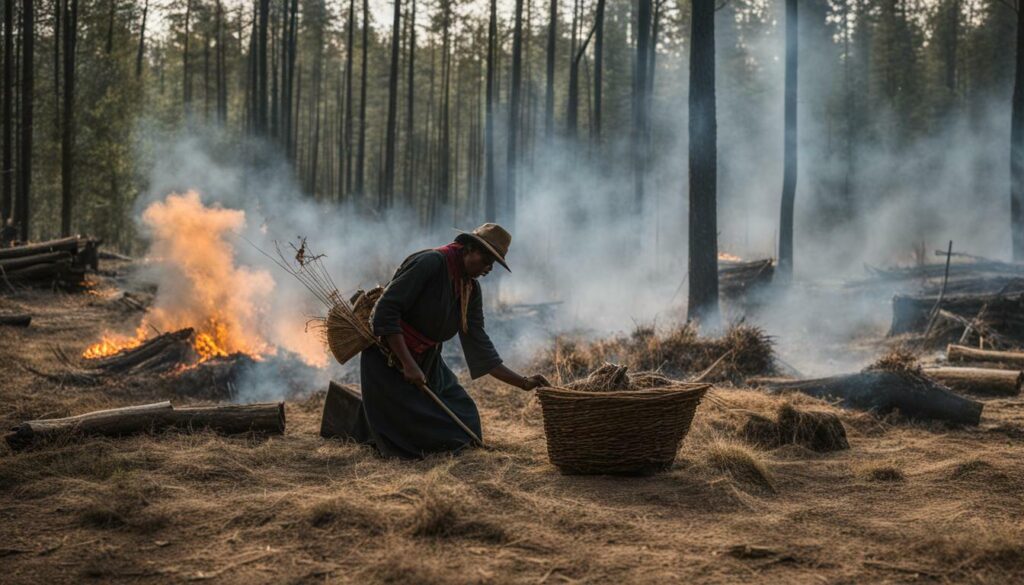

Continue to explore and practice these vital skills, expanding your knowledge and repertoire. In the ever-changing world we live in, being prepared and self-reliant is not just a lifestyle choice; it is a necessity.
Conclusion
Congratulations on completing this comprehensive guide on how to be a prepper and mastering survival skills. By implementing the strategies and acquiring the necessary skills, you are well on your way to becoming self-reliant and prepared for any scenario.
Throughout this guide, we have explored the importance of acquiring a wide range of skills that are essential for survival in a post-collapse society. From growing food and foraging for wild edibles to developing medical knowledge and first aid skills, each skill plays a crucial role in ensuring your self-sufficiency.
Building prepper supplies, from essential food and water storage to crafting and constructing necessary items, will further enhance your preparedness. Additionally, honing skills in hunting, trapping, and fishing will provide alternative food sources while mastering communication and signaling methods will enable you to stay connected even in remote areas.
By expanding your knowledge in herbal medicine and natural remedies, you can maintain your health and treat common ailments in a survival scenario. And let’s not forget the importance of mastering primitive skills like fire-making, shelter-building, and foraging, as they are fundamental to survival.
Remember, becoming a prepper and mastering survival skills is an ongoing journey. Continuously practice and refine your skills to ensure you are always prepared for any situation that may arise. So keep learning, growing, and preparing. You’ve got this!
FAQ
What are the essential survival skills for prepping?
Essential survival skills for prepping include growing food, medical skills, building and construction, hunting and fishing, food preservation and storage, sewing and crafting, navigation, self-defense, blacksmithing and carpentry, herbal medicine, communication and signaling, and primitive skills.
Why is it important to practice and expand survival skills?
Practicing and expanding survival skills is important to be better prepared for any situation and to become self-reliant in post-collapse society.
What are some ways to preserve and store food for survival?
Some methods of preserving and storing food for survival include canning, dehydrating, and pickling.
What are some essential items that can be crafted and constructed for survival?
Essential items that can be crafted and constructed for survival include shelters, furniture, and tools.
How can communication and signaling be done in survival situations?
Communication and signaling can be done through methods such as Morse code and ham radio operation.
What are some basic primitive skills for survival?
Basic primitive skills for survival include fire-making, shelter-building, and foraging for wild edibles.
